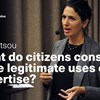legitimately
An Ombudsman for Future Generations, Legitimate and Effective?
in: Institutions For Future Generations, Iñigo González-Ricoy and Axel Gosseries (red.), Oxford: Oxford University Press. 117-134. This chapter examines the possibility to establish ombudsmen as instr
Lukas Meyer: Legitimate Expectations and Compensation in Changing Circumstances
Venue: Institute for Futures Studies, Holländargatan 13 in Stockholm Research seminar with Lukas Meyer, professor of philosophy at the University of Graz. Abstract: This paper discusses how legitimate exp

Eri Bertsou: What do citizens consider to be politically legitimate uses of expertise?
Can democratic politics incorporate citizen demands for independent expertise in ways that boost legitimacy and trust in politics? Democratic governments worldwide face the dilemma of how to deal with
Eri Bertsou: Varieties of Expertise: What do citizens consider to be politically legitimate uses of expertise
Venue: Institutet för framtidsstudier, Holländargatan 13, 4th floor, Stockholm, and online Research seminar with Eri Bertsou, Assistant Professor of Political Science, University of St. Gallen (HSG).REG
Middle-Class Precarity and the Re-Legitimation of the Welfare State
Professor Michael Shalev, Department of Sociology, Hebrew University, Jerusalem Seminars host is Stefan Svallfors. The seminars are free of charge and take place at 13.00–14.30 in the Institute’s semin
Bo Rothstein: A social science dilemma. Is there a contradiction between democracy and quality of government?
Research seminar with Bo Rothstein.AbstractMost definitions of democracy rely on a set of procedural rules for how political power should be accessed legitimately. The basic norm for these procedural ru realized by equal democratic rights. In this understanding of political legitimacy, democracy is a “partisan game” where various interests are given fair possibilities to compete for political power. The concept of “quality of government” relates to the legitimacy in the of political power and is based on the norm of that is the opposite of partisanship. This is to be realized by, for example, the rule of law and a public administration built on meritocracy. Several tensions between these two bases for achieving political legitimacy will be present. For example, a democratically elected government may want to politicize the public administration and may establish public services and benefits directed only to their political supporters. The rule of law includes the principle of equality before the law, but a democratically elected government may take actions that put itself “above” the law. Various empirical measures and philosophical principles for understanding these type of tensions between democracy and the quality of government will be presented in this lecture.

Bo Rothstein: Is there a contradiction between democracy and quality of government?
Most definitions of democracy rely on a set of procedural rules for how political power should be accessed legitimately. The basic norm for these procedural rules is according to noted democracy theor
The Demos and Its Critics
The Review of Politics, 81(3), 435-457. doi:10.1017/S0034670519000214 Abstract The “demos paradox” is the idea that the composition of a demos could never secure democratic legitimacy because the composi
Three Conceptions of Law in Democratic Theory
The Canadian Journal of Law & Jurisprudence Abstract Democratic theory tends to proceed on the assumption that law requires democratic legitimation because it is coercive. However, the claim that la
Authority and Coercion Beyond the State? The Limited Applicability of Legitimacy Standards for Extraterritorial Border Controls
Jus Cogens, vol. 6, p.141–160 Abstract Extraterritorial border controls prevent migrants from arriving at the territory of the state and effectively undermine rights to apply for asylum and protections








